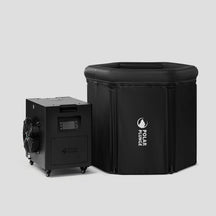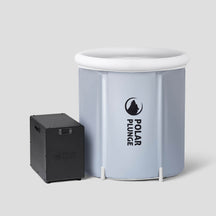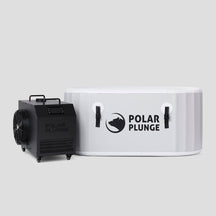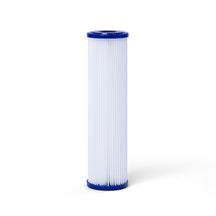In recent years, cold plunge ice baths have gained popularity, especially among athletes and wellness enthusiasts. However, their benefits extend beyond physical recovery and pain relief, they can also be a game-changer for people struggling with insomnia and poor sleep quality. Let’s dive into how ice baths impact the body and how this practice can enhance your sleep.
1. The Science of Cold Plunge Ice Baths and Sleep
Cold exposure, particularly through ice baths, triggers various physiological reactions in the body that can positively affect sleep. The body's temperature and its regulation play a significant role in how well you sleep. During an ice bath, your body experiences a sharp drop in temperature, which prompts several reactions that can help combat insomnia and improve sleep quality.
Key Effects of Cold Plunges on the Body:
-
Vasoconstriction and Vasodilation: When you immerse yourself in cold water, your blood vessels constrict (vasoconstriction). This limits blood flow to your extremities and redirects it to your vital organs. Once you get out of the cold water, your blood vessels dilate (vasodilation), allowing fresh, oxygenated blood to flood back into your muscles and tissues. This process promotes circulation and aids in recovery, which can indirectly calm the body and reduce stress.
-
Activation of the Parasympathetic Nervous System: Cold exposure activates the parasympathetic nervous system, also known as the "rest-and-digest" system. This counters the effects of the fight-or-flight response, encouraging a state of relaxation. Lowering stress levels and inducing calm are critical for improving sleep onset and sleep quality.
-
Reduction in Core Body Temperature: Your body naturally lowers its core temperature as part of its nightly routine before sleep. Ice baths can mimic this process by cooling down your body faster, signaling to your brain that it’s time to wind down and prepare for rest.
2. How Cold Plunge Ice Baths Help with Insomnia
Insomnia, characterized by difficulty falling asleep or staying asleep, is often linked to high stress, anxiety, or an overactive nervous system. Cold plunges have several mechanisms that help counter these issues.
Reducing Anxiety and Calming the Mind
One of the significant benefits of cold immersion is its ability to reduce anxiety. Ice baths trigger the release of norepinephrine, a hormone that enhances focus and mood but also helps calm overactivity in the brain. This can significantly reduce racing thoughts and restlessness, which are common triggers for insomnia.
Promoting Better Sleep Through Endorphins
After enduring the shock of an ice bath, your body releases endorphins—natural painkillers and mood boosters. This surge in endorphins can leave you feeling relaxed, happy, and content. A reduction in stress levels combined with the calming effects of endorphins sets the stage for falling asleep more easily.
3. Cold Plunge and Sleep Quality: Deep, Restful Sleep
Cold exposure not only helps you fall asleep more easily, but it also contributes to better sleep quality overall. Sleep quality is determined by how well you move through the different stages of sleep, including light sleep, deep sleep, and REM sleep. Cold plunge ice baths may help improve each stage in the following ways:
-
Improved Deep Sleep: Deep sleep is when the body undergoes most of its repair and regeneration processes. By reducing muscle soreness and inflammation, ice baths help your body recover faster, allowing for more restful deep sleep. This is especially beneficial for athletes or those with physically demanding lifestyles.
-
Regulation of Circadian Rhythms: Your circadian rhythm, or internal clock, controls your sleep-wake cycle. Cold exposure, especially in the evening, can signal to your body that it’s time to rest, making it easier to fall into a natural sleep pattern and wake up feeling more refreshed.
-
Boosting Melatonin Production: Melatonin is a hormone that regulates sleep. Cold water immersion can help enhance the production of melatonin by regulating your core temperature and reducing cortisol levels (the stress hormone), which interferes with sleep.
4. Tips for Using Cold Plunge Ice Baths to Improve Sleep
If you're ready to incorporate cold plunge ice baths into your routine to improve sleep, here are some tips to maximize the benefits:
-
Timing Matters: Try to take a cold plunge in the late afternoon or evening, but not too close to bedtime. This allows your body to gradually wind down while benefiting from the core temperature drop.
-
Keep It Short: You don’t need to stay in the ice bath for long—5 to 10 minutes is usually sufficient. Longer exposure can be stressful rather than relaxing.
-
Combine with Relaxation Techniques: Cold plunges can be complemented by other relaxation techniques like deep breathing, meditation, or gentle stretching to enhance the calming effects on your nervous system.
-
Consistent Practice: Incorporate cold plunges into your routine 2–3 times a week to see long-term improvements in sleep quality.
5. Additional Benefits of Cold Plunge Ice Baths
While improving sleep is a major benefit, cold plunge ice baths offer several other advantages:
-
Increased energy levels: The burst of norepinephrine and improved circulation following a cold plunge can leave you feeling energized throughout the day.
-
Enhanced recovery: Athletes and fitness enthusiasts often use ice baths to accelerate recovery, reduce muscle soreness, and prevent injuries.
-
Improved mood and resilience: Cold exposure has been linked to enhanced mental resilience and a better ability to handle stress, which contributes to overall well-being.
Conclusion
Cold plunge ice baths may seem intimidating, but their potential benefits for those suffering from insomnia and poor sleep quality are worth considering. By helping reduce stress, calm the nervous system, and improve the body's natural sleep processes, cold plunges can significantly enhance the quality of your rest. If you’re looking for a natural, drug-free way to combat insomnia, adding regular cold plunges to your routine could be the refreshing solution you need.






